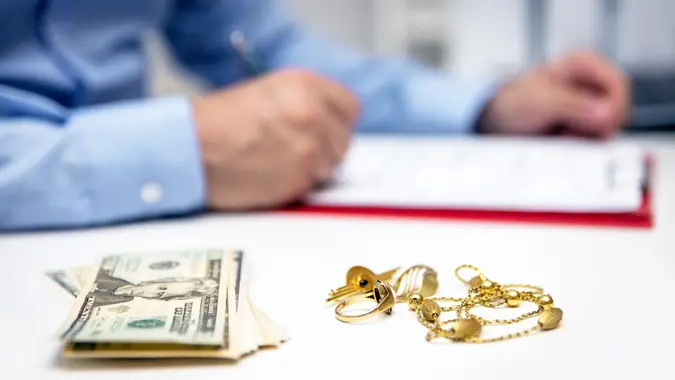How Do Pawn Shop Loans Work? What To Know Before You Borrow

Commitment to Our Readers
GOBankingRates' editorial team is committed to bringing you unbiased reviews and information. We use data-driven methodologies to evaluate financial products and services - our reviews and ratings are not influenced by advertisers. You can read more about our editorial guidelines and our products and services review methodology.

20 Years
Helping You Live Richer

Reviewed
by Experts

Trusted by
Millions of Readers
Pawn shop loans are an alternative if you have valuables and need money fast. They’re more expensive and less flexible than traditional financing, though, and they don’t help you build credit. Here’s what you should know.
What Is a Pawn Shop Loan?
Pawn shop loans let you use personal items as collateral to get cash — effectively secured loans.
You give the shop a valuable personal item, like an acoustic guitar or designer watch, in exchange for some quick cash. You’ll keep the item if you repay the loan, along with fees and interest. If you don’t, the pawn shop can keep and sell it.
Here are some facts you should know:
- Pawn shops have high interest: Pawn shops usually charge around 20% to 25% in interest each month.
- Your item is at risk: If you can’t repay the loan, the pawn shop will hang onto your item.
- There may be additional fees: Pawn shop loans are not free. There may also be storage, appraisal or redemption fees, ranging between $10 to $25.
Good To Know
Pawn shop loans are typically small and short-term. Per the National Pawnbrokers Association (NPA), the average pawn shop loan is $150 for about 30 days.
How Do Pawn Shop Loans Work?
While the process can vary slightly by shop and state, most pawn shop loans involve the following steps.
- You bring in a valuable item, like a gold ring, and offer it to the shop in exchange for a small, short-term loan.
- The pawn shop appraises this item usually for an upfront fee. The appraisal determines how much the item is worth — and how much the shop will lend you. Expect those amounts to differ. “Usually, you are getting much less than the value of the goods you have as collateral because the pawn shop needs to make a profit,” said Hugh Steven Morris, Chartered Retirement Planning Counselor (CRPC) and president at The Morris Group.
- The pawn shop makes an offer. Loan amounts generally run between 25% to 60% of the item’s resale value. You can negotiate this offer.
- You get your cash and a pawn ticket, which is effectively your loan contract. It outlines the borrowed amount, its due date, interest rate, and any extra fees that apply.
- The pawn shop retains your item. You’ll have a set time to repay before they can sell it. Most pawn shop loans are short-term and due within 30 to 90 days.
- You repay the loan, plus fees and interest, to retrieve your item. If you can’t repay it, the pawn shop will keep the item, though some offer renewals or extensions.
Pawn Shop Loan Example
Say you bring a gold ring to a pawn shop for a loan. The shop appraises the item, charging an upfront $20 fee, and offers to lend you $200 at a 25% interest rate, due in 30 days. The loan also carries a $10 storage fee and a $15 redemption fee.
When you return to the shop to retrieve the ring at the end of the month, you’ll owe $275 but will have paid $295 over the life of the loan.
- Appraisal fee: $20
- Amount borrowed: $200
- Interest owed: $50
- Storage fee: $10
- Redemption fee: $15
- Total cost: $295
Keep in mind that pawn shop loans typically express interest as a monthly or daily percentage as opposed to traditional lenders who use annual percentage rates (APRs). Comparing apples-to-apples, pawn shop rates are quite high, representing APRs of 200% or more.
Pawn Shop Loan Requirements
Pawn shop loans don’t have stringent requirements, like proof of employment or a credit check. However, they generally require the following:
- Government-issued photo ID, like a passport or driver’s license
- An item accepted as collateral
- Proof of ownership, like a receipt or bill of sale
You also must be 18 or older to borrow money from a pawn shop.
What Items Can You Pawn?
You can pawn the following items at your local pawn shop.
Pros and Cons of Pawn Shop Loans
Pros:
- No credit check
- No proof of employment or in-depth loan application
- Fast cash, usually same-day
- No impact on your credit score
Cons:
- High interest rates
- Extra fees
- Short repayment windows
- You can lose the item if you can’t repay
- No opportunity to build credit
Pawn Loans vs. Selling at a Pawn Shop
You can also sell items upfront to a pawn shop to get some cash. Here are some key differences between pawn shop loans and pawn shop sales.
| Pawn Loan | Pawn Sale | |
|---|---|---|
| Cash on the spot? | Yes | Yes |
| Get the item back? | Yes, if repaid | No |
| Pay interest? | Yes | No |
| Shop offer? | Lower amount | Higher amount |
| Appraisal fee? | Usually | Sometimes |
| Storage fee? | Usually | No |
| Redemption fee? | Usually | No |
What Happens if You Can’t Repay the Loan?
If you can’t repay a pawn shop loan, the shop retains the item. However, some shops offer loan extensions or renewals. Extensions give you more time to repay the original loan. Renewals are a new loan on the same item. Both options usually involve paying accrued interest and additional fees.
The upside is that unpaid pawn shop loans won’t damage your credit score. Pawn shop owners don’t report to the credit bureaus, and, even if they did, your loan is collateralized, meaning the item satisfies the debt to the lender.
Who Should — and Shouldn’t — Consider a Pawn Shop Loan
Pawn shop loans aren’t ideal for everyone or in every situation. Here’s who might want to opt for this type of financing vs. who should look elsewhere.
Good for:
- People with valuables who need fast cash
- Borrowers who don’t want or can’t pass a credit check
- Those who can repay the loan quickly
- Anyone OK with risking a personal item
Not ideal for:
- People without valuable items to pawn
- Borrowers trying to build or repair credit
- Those who may struggle to repay within a few weeks
- Anyone looking for a large loan amount
“I would consider [a pawn shop loan] if I just needed a bridge loan to pay a bill or make a car repair,” Morris said. “If one doesn’t have the best repayment history this might be a good option. However, if one has other means by which to borrow money, that is what I would do. The cost is going to be much lower.”
Alternatives to Pawn Shop Loans
Consider these alternatives if a pawn shop loan isn’t right for you.
Personal Loans
Personal loans offer more flexibility than pawn shop loans, with terms typically lasting between one to seven years. They also tend to carry fewer fees and lower interest rates. Plus, you can build credit by repaying a personal loan as agreed.
Consider these personal loans for bad credit if you’re worried about your creditworthiness.
Borrowing from Friends or Family
A loved one might be willing to extend you a short-term, small-dollar loan without charging fees or interest. If you borrow money from a friend or family member, keep in mind that there are pros and cons. Set some ground rules and make sure a deadline is set in stone.
Credit Card Cash Advances
Credit card cash advances don’t require collateral, but they are expensive. They often charge 3% to 5% transaction fees on top of 29.99% APRs. Still, they’re an option if you need emergency cash and a more flexible payment window.
Side Gig Revenue
Pawn shop loans are for small-dollar amounts, meaning a top side gig, like selling used items online or doing some handyperson work, could generate the funds you need without necessitating fees or interest.
FAQs on Pawn Shop Loans
Curious about how pawn shop loans work, especially if you need fast cash? Take a look at these answers to frequently asked questions.- How much can I get for a pawn loan?
- Pawn loan amounts vary depending on the item you offer as collateral, though they can range from a few hundred to a few thousand dollars. The average pawn shop loan is $150, according to the NPA.
- Do pawn shops check your credit?
- Pawn shops don't check your credit when you ask for a loan, as these loans are secured by a personal item the shop obtains if you fail to repay.
- Are pawn shop loans safe?
- Pawn shop loans are generally considered safer among nontraditional financing options, like payday loans, title loans or cash advances, given pawn shop loans don't affect your credit and, in worst-case scenarios, the shop keeps your item and considers the debt repaid. However, pawn shops charge higher interest rates and more fees than traditional financial institutions.
Our in-house research team and on-site financial experts work together to create content that’s accurate, impartial, and up to date. We fact-check every single statistic, quote and fact using trusted primary resources to make sure the information we provide is correct. You can learn more about GOBankingRates’ processes and standards in our editorial policy.
- NPA. "What is a pawn transaction?"
- EZPawn. "What Can I Pawn?"
- EZPawn. "Should I Pawn or Sell?"
- MaxFerd. "How Are Interest Rates and Fees Calculated for Pawn Loans?"
- The Pawn Experts. "What's the Difference Between Pawning and Selling?"
 Written by
Written by  Edited by
Edited by 





















